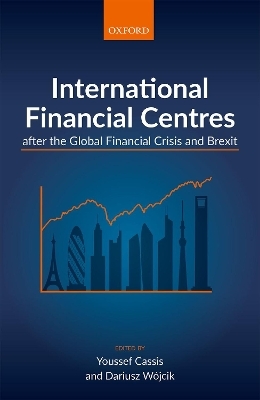
International Financial Centres after the Global Financial Crisis and Brexit
Oxford University Press (Verlag)
978-0-19-881731-4 (ISBN)
This is an open access title available under the terms of a CC BY-NC-ND 4.0 International licence. It is free to read on the Oxford Academic platform and offered as a free PDF download from OUP and selected open access locations.
As well as marking the tenth anniversary of the collapse of Lehman Brothers and the consequent unleashing of the global financial crisis, 2018 is also the year of negotiations on the terms of the UK's exit from the European Union. Within a decade the banking world has witnessed two epochal events with potential to redraw the map of international financial centres: but how much has this map actually changed since 2008, and how is it likely to change in the near future?
International Financial Centres after the Global Financial Crisis and Brexit gathers together leading economic historians, geographers, and other social scientists to focus on the post-2008 developments in key international financial centres. It focuses on the shifting hierarchies of New York, London, Paris, Geneva, Zurich, Frankfurt, Singapore, Hong Kong, Beijing, Shanghai, and Tokyo to question whether Asian financial centres have taken advantage of the crisis in the West. It also examines the medium-effects of the crisis, the level of regulation, and the rise of new technology (fintech). By exploring these crucial changes, it questions whether shifts in the financial industry and the global landscape will render these centres unnecessary for the functioning of the global economy, and which cities are likely to emerge as hubs of new financial technology.
Youssef Cassis is Professor of Economic History at the European University Institute, in Florence. His work mainly focuses on banking and financial history, as well as business history more generally. His most recent publications include Capitals of Capital: A History of International Financial Centres, 1780-2005 (Cambridge University Press, 2006, 2nd revised edition, 2009), Crises and Opportunities: The Shaping of Modern Finance (OUP, 2011), and, with Philip Cottrell, Private Banking in Europe: Rise, Retreat and Resurgence (OUP, 2015). He has also recently co-edited, with Richard Grossman and Catherine Schenk, The Oxford Handbook of Banking and Financial History, (OUP, 2016). Professor Cassis was the cofounder, in 1994, of Financial History Review (Cambridge University Press). Dariusz Wójcik is Professor of Economic Geography at the School of Geography and the Environment, Oxford University, and Fellow of St Peters College Oxford. His research focuses on finance, globalization, and urban and regional development. He has published several books and over fifty articles, and serves on the editorial board of Economic Geography, the Journal of Economic Geography and GeoJournal. His recent books include The Geography of Finance: Corporate Governance in a Global Marketplace (OUP, 2007) and The Global Stock Market: Issuers, Investors and Intermediaries in an Uneven World (OUP, 2011). He is the co-editor of the New Oxford Handbook of Economic Geography (OUP, 2018). He has held visiting positions at the London School of Economics and Political Science, Hong Kong University, National University of Singapore, Beijing Normal University, and the University of Sydney, and convened the Global Conference on Economic Geography 2015.
1: Youssef Cassis: Introduction: A Global Overview from a Historical Perspective
2: Richard Sylla: New York: Remains a, if not the, Pre-eminent International Financial Centre
3: Richard Roberts: London: Downturn, Recovery and New Challenges - but still Pre-eminent
4: Laure Quennouëlle-Corre: Paris: The Possibility of Revival as an International Financial Centre
5: Eike W. Schamp: Frankfurt: A Tale of Resilience in the Crises
6: Tobias Straumann: Zurich and Geneva: The End of the Golden Age
7: David R. Meyer: Hong Kong, Shanghai, and Beijing: China's Contenders for Global Financial Centre Leadership
8: Karen P.Y. Lai: Singapore: Connecting Asian Markets with Global Finance
9: Sayuri Shirai: Tokyo: Still Below its Potential as a Global Financial Centre
10: Dariusz Wójcik and Theodor F. Cojoianu: Conclusions: A Global Overview from a Geographical Perspective
| Erscheinungsdatum | 23.07.2018 |
|---|---|
| Verlagsort | Oxford |
| Sprache | englisch |
| Maße | 163 x 242 mm |
| Gewicht | 560 g |
| Themenwelt | Geschichte ► Teilgebiete der Geschichte ► Wirtschaftsgeschichte |
| Naturwissenschaften ► Geowissenschaften ► Geografie / Kartografie | |
| Wirtschaft ► Betriebswirtschaft / Management ► Finanzierung | |
| Betriebswirtschaft / Management ► Spezielle Betriebswirtschaftslehre ► Bankbetriebslehre | |
| Wirtschaft ► Volkswirtschaftslehre ► Finanzwissenschaft | |
| Wirtschaft ► Volkswirtschaftslehre ► Makroökonomie | |
| ISBN-10 | 0-19-881731-2 / 0198817312 |
| ISBN-13 | 978-0-19-881731-4 / 9780198817314 |
| Zustand | Neuware |
| Haben Sie eine Frage zum Produkt? |
aus dem Bereich


